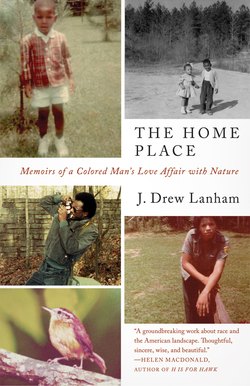Читать книгу The Home Place - J. Drew Lanham - Страница 12
На сайте Литреса книга снята с продажи.
ОглавлениеA Good Name
A good name is rather to be chosen than great riches, and loving favor rather than silver and gold.
Proverbs 22:1
IN 1928, THE YEAR MY FATHER WAS BORN, HERBERT HOOVER completed his tenure as Secretary of Commerce and was elected president. J. Edgar Hoover was director of the Bureau of Investigation, which he would help turn into the FBI seven years later. It was a good time to bestow the name “Hoover” on a son for whom you had great hopes. But when the reckless abandon of the Roaring Twenties came to a screeching halt, “Hoover” rapidly lost its currency as a name. The presidential Hoover, Herbert, was the man in charge as the nation sunk eyeball deep into the most miserable years of the Depression. The law-enforcing Hoover, J. Edgar, used and abused the law to the furthest extent of his eccentric will for almost fifty years. These were poor namesakes; “Hoover” was not an auspicious star under which to begin.
James Hoover Lanham, however, was my father. There were other names people called him: “James,” “James H.,” “Trap,” “Ish,” “Big Chief,” “Daddy.” According to Mamatha her Hoover was something of a prodigy, sitting in his father’s classroom at Bettis Academy among much older children. Hoover must’ve been a sponge, soaking up everything he could from schoolbooks and at Daddy Joe’s side. He read, ciphered, and studied his way into joining the best, brightest, and boldest that black Edgefield had to offer.
The Lanham boy probably wasn’t ever a hell-raiser. In all likelihood he was obedient to a father-loving fault. In the Lanham family dutifulness is a valued commodity. It can be traded for all sorts of highly sought-after things otherwise difficult to gain: praise, freedom, and favor. Daddy Joe and Mamatha heaped a shit-ton of all three on their only son. He could do no wrong; he was dependable, respectful, intelligent, and strong. He was the golden boy cast in burnished bronze. Even his three older sisters—Louise, Pearl, and Ruby—looked up to the child some would later claim was born grown.
Hoover was a child during the Great Depression and came of age at the height of World War II. What was it like growing up in a world where despair was the common cry for almost two decades? When the prairie soils blew east on dust bowl winds, how did Mamatha and Daddy Joe convince their children that there was hope beyond the clouds of dirt falling from the sky? I wonder what the thirteen-year-old Hoover thought about as news of the attack on Pearl Harbor arrived. Did word of the battles raging across the globe frighten him? Did stories of a maniac talking of a white super-race make him fearful for his black future? Did he know where places like Berlin, Paris, Guadalcanal, or Okinawa were before young men went there to kill or be killed? What was daily life like as shortages, rationing, and other widening ripples of the war hit home? Was Hoover inspired when he heard about black men being given the chance to fight with guns, as soldiers, rather than with pots and brooms, as cooks and cleaners? Did it seem like the world was going to end when a bomb might destroy cities in a single flash? Did his father ever talk to Hoover about the horrors of battle and how the war he’d fought in was supposed to end all other wars—but didn’t?
Hoover grew up in a world of turmoil. As the radio spilled Duke Ellington’s and Count Basie’s big band tunes rumor must’ve spun horrific stories of all the inhumane things happening in faraway places. As the war finally ended and Hoover was nearing manhood at seventeen, maybe there was a hope growing that the world hadn’t experienced in almost twenty years. After Bettis, an optimistic Hoover headed to Claflin College in Orangeburg, South Carolina, to get a college degree and make his own way forward.
But then another war broke out. The threat of a former ally’s communist ideology, a “red scare,” led to the Korean Conflict. Hoover was done with college and had to go. But a technicality took him away from the battle lines, as I’ve mentioned, and sent him to Europe instead.
There are a few pictures of Hoover in Germany. Relieved of the horrors his father had seen in the trenches of France, but also of the responsibilities of farm and Home Place, he was released to become the man his buddies called “Ish.” I love the photos that show him smiling in the middle of some good time. In one he’s on ski patrol, a black man in the white snow. The wide grin on his face matches the powder he’s posed against, looking ready to take off on some mission. It looks more like fun than duty to me. Another picture shows him locked in a card game. There’s a cigarette hanging onto a half-cocked smile that gives away what must’ve been a nice hand and an even better time. I can almost hear “Ish” chuckling at the prospect of the win and maybe some bet.
Where did all of that free-flowing laughter go? I suppose the responsibilities waiting for Ish back home, once the pretty frauleins disappeared and farming and family became the priority, took some of that away. Life turned a corner. An ailing father and an increasingly dependent mother meant he was Hoover again.
